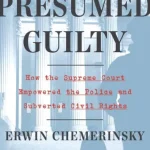Sentencing the Self-Convicted: The Ethics of Pleading Guilty
 Editors: Julian V. Roberts & Jesper Ryberg
Editors: Julian V. Roberts & Jesper Ryberg
Publisher: Hart Publishing, 2023. 245 pages.
Reviewer: Richard L. Lippke | March 2023
Julian Roberts and Jesper Ryberg have assembled an estimable group of scholars whose contributions address a range of issues related to the submission of guilty pleas (or in some legal regimes, admissions of guilt) by individuals charged with crimes. As the essays in this valuable collection reveal, sentencing the ‘self-convicted’ is controversial in ways that reveal deeper fault lines among penal and criminal procedure theorists.
Central to many of the contributions to this volume is the question of whether those who admit their guilt ought to receive reduced sentences and, if so, how substantial should those reductions be. Authors with desert retributivist sympathies tend to answer the former question negatively, or at least urge considerable restraint in the awarding of sentence discounts to the self-convicted. Authors who believe that sentencing should give only some weight to offenders’ deserts or who favor other approaches to sentencing seem more comfortable with awarding discounts to those who admit their guilt. Importantly, all of the authors in this volume are wary of the ways in which the known availability of such reductions puts pressure on the accused to plead guilty and thus might tempt the innocent to do so. Notably, none of the authors defend the kinds of free-wheeling sentencing negotiations that are seen in US-style plea bargaining, ones that give prosecutors wide-ranging discretion to induce guilty pleas through forms of charge bargaining combined with substantial sentence reduction proffers. The collective (good) sense of all of the authors is that US plea negotiation practices have the potential to put too much pressure on the innocent (or not provably guilty) and produce sentencing outcomes that are not reliably related to the actual criminal misconduct of the accused.
The first three contributions display considerable unease with awarding sentence discounts, based on retributive logic, to those who seem willing to admit their guilt although their reasons for such unease vary. Antony Duff wisely counsels us to consider the background conditions under which guilt admissions occur. He contrasts utopian criminal justice systems with relatively dystopian ones. In the former, guilty pleas can plausibly be understood as admissions of failures by individuals to live up to their civic responsibilities. Accordingly, the individuals in question should not seek to have their sentences reduced, although Duff is careful to argue that individuals in such societies should not be punished more severely for exercising their right to trial. In societies that exhibit a variety of criminal justice shortcomings or outright failures, Duff admits that things are more complicated. Individuals charged with violations of unjust criminal prohibitions or who are singled out for prosecution in ways that other members of society are not will find themselves in binds that might justify them being more strategic about their accession to guilty pleas.
Zachary Hoskins worries about the pressures on the innocent to plead guilty that proffers of charge or sentence discounts create. Unlike others, he is willing to have society pay the price for rejecting such discounts: more, and presumably many more, trials with their substantial social costs. He recognizes that trials are not panaceas unless the accused can rely on competent and motivated defense attorneys, which will add further costs. In light of these burdens, Hoskins suggests we might do other things to reduce the costs of the criminal justice system, such as eliminating some criminal prohibitions the enforcement of which clog criminal justice systems.
In his essay, Jesper Ryberg develops further a critique of retributive approaches to sentencing that he has pursued in his previously published work. If the notion of proportionality that is central to retributivism cannot be mined to yield determinate sentencing schemes, or if (as he argues in this volume) the two aspects of it, in the forms of cardinal and ordinal proportionality, yield conflicting advice about the justice of sentence discounts in some contexts, then Ryberg is not convinced that such an approach to sentencing will be of much use. This leaves open, of course, whether other approaches to sentencing can be made more determinate, along with what they might counsel about the legitimacy and magnitude of sentence discounts for those disinclined to contest their guilt.
Two essays in the volume, one by Julian Roberts and Netanel Dagan, and the other by Thom Brooks, directly address, at length, the permissibility and magnitude of sentence discounts for the self-convicted. Both essays urge the deployment of such reductions in ways that are more or less in keeping with sentencing practices in England and Wales. While such practices discourage charge bargaining (and with it, presumably, over-charging), they grant larger sentence discounts (up to 30 percent) to those who indicate they are willing to plead guilty early in the process and smaller ones for those who do so right before their trials are set to begin. Although the authors of these two essays recognize the pressures to plead guilty that such discounts create, they support them based on such considerations as the substantially reduced costs to the charge adjudication system and the ways in which guilty pleas alleviate the burdens on victims, who might be reluctant to testify at the trials of those who criminally wronged them. Roberts and Dagan explicitly warn against smaller sentencing discounts, unconvinced that, say, 10 percent discounts will induce most accused persons to admit their guilt. We might wonder about this, especially in legal regimes in which nothing else is offered to those accused of crimes. Will individuals who know they are guilty, or who strongly suspect so, risk the extra 10 percent by going to trials that are not likely to yield acquittals and which might have their own costs and drawbacks (for instance, more time spent in pre-trial detention until such trials occur)? Perhaps they would, in which case larger proffered discounts might prove necessary. Brooks, in turn, arguing against those who worry that somewhat larger sentence discounts will pressure the accused too strongly to plead guilty, whether they are guilty or provably guilty or not, contends that we probably lack empirical evidence that such pressure is what induces so many accused to self-convict. He might be right about this, but I suspect we also lack empirical evidence that smaller discounts will fail to induce most guilty accused persons to admit their guilt and get on with their punishment.
As for the benefits to victims of having those who criminally wronged them admit their guilt in exchange for sentence concessions, Marie Manikis makes the valuable point in her contribution that not all victims will be alike in wanting to avoid having to testify at trials or in desiring to avoid confronting those who criminally wronged them. Some victims will very much want to testify against those who wronged them or have the court (and the larger public) hear about the ways in which the crimes against them set back their interests. To this we might add that more than a few crimes processed by contemporary criminal justice systems lack direct victims. Many of the mala prohibita enforced by the criminal law are of this kind and thus victim-focused arguments for sentence concessions for those who self-convict will lack weight in such cases.
Leo Zaibert’s contribution is harshly critical of US-style plea bargaining and adversarial forms of criminal justice more generally. He favors European forms of criminal trials, which he sees as more focused on getting at the truth of the charges against those accused of crimes. Presumably, he has no use for negotiated pleas, whatever the magnitude or kind of the sentencing discount on offer. Although much of what he says is persuasive, we might be given pause by, among other things, the descriptions of plea negotiations in the courts of England and Wales provided in the valuable contribution by Mike Hough and Jessica Jacobson. In it, Hough and Jacobson detail the complexities of such negotiations and the apparent commitment by courts to arrive at charges and associated sentences that better capture and officially respond to what the accused have (or have not) done. Importantly, judges in the cases they describe often consult with victims in their efforts to negotiate pleas. Although Hough and Jacobson rightly worry about certain aspects of such negotiated pleas, one cannot help but come away from their account with the sense that the courts in some negotiated plea regimes make serious efforts to get at the truth of what the accused have or have not done. Perhaps Continental criminal justice systems do a better job overall of this, but it does not follow that adversarial systems must be abject failures in this regard.
Other essays in the volume make significant points but seem less helpful in resolving the central issues raised by negotiated pleas. Rebecca Helm argues that almost all sentence reductions that might be granted for guilty pleas put pressure on defendants and are therefore suspect. Yet it is hard to believe that the size or kind of such reductions does not matter at all and it is difficult to imagine the absence of all pressures—e.g., pre-trial detention, trial delays, the need to miss work to attend trials, etc.—on the accused that might induce them to accede to guilty pleas. Gabrielle Watson urges us to consider how the value of self-respect bears on guilty pleas. She is particularly concerned with vulnerable accused persons who lack proper legal counsel, are mentally ill, or have dependent children and who might, therefore, be tempted to plead guilty (although they are innocent or not provably guilty) in order to avoid longer sentences or ones involving custody. Although I agree that aspects of criminal procedure can undermine the self-respect of accused persons, I am not convinced that self-respect is an especially helpful concept in thinking about guilty pleas and the appropriate magnitude of sentence discounts awarded for them, especially for the many accused persons who are (and who know or suspect they are) guilty. Finally, Adam Kolber’s thoughtful and provocative essay on the limited epistemological value of trials and guilty pleas to our assessments of the guilt or innocence of the accused seems a bit tangential to the concerns of the volume.
Surprisingly, there is little mention in the contributions of repeat offenders and the ways in which sentencing them might seem in tension with guilty plea sentencing discounts. Even if we believe that those willing to admit their guilt should receive some acknowledgement of this in the form of reduced sentences, individuals with lengthy criminal records who have apparently not been chastened by their previous convictions might give us pause in that regard. Likewise, there is only brief discussion of crime reduction logic in the sentencing of those who self-convict. Perhaps the authors are confident that reduced sentences do little to diminish punishment’s general deterrent or incapacitation effects, but while they might be correct about this, further discussion of the topic might have proved useful, especially by those prepared to countenance substantial sentence discounts or ones that exchange noncustodial sentences for custodial ones. Finally, there seems some tendency in the contributions to cast desert-based approaches to sentencing in more stringent terms than some retributivists would endorse. Retributivists who regard deserved punishment as a duty might lean against accepting guilty plea discounts. But retributivists who regard desert as furnishing a reason for the state to punish, the strength of which varies depending on the seriousness of the crime(s) in question, could concede that the burdens on society of trials (not to mention longer sentences) ought to have some weight in our thinking about how to structure criminal procedure. They might note that criminal justice is important, but they may also consider other demands on the state, all of which require the investment of limited resources. Perhaps, so long as the sentences assigned to those who admit their guilt are not clearly disproportionate, we should accept some departures from strictly proportionate sentencing regimes (assuming we know what those look like) to reduce the burdens of criminal justice.
Richard L. Lippke is an Emeritus Professor of Criminal Justice at Indiana University Bloomington.


